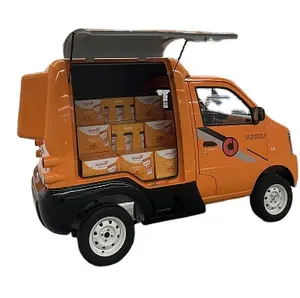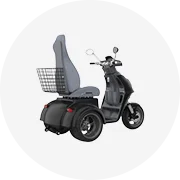
Price Fast Food Smart Autonomous Commercial Automated Box Rc Meal Self Driving Delivery Robot Vehicle


Custom New New Energy Solar Power Four-wheel Electric Car 6-14-17 Take Electric Car Scenic Tour Car Manufacturers





















Electric Food Delivery Vehicles (EFDVs) are purpose-built for the distribution of foodstuffs, serving the logistical requirements of caterers, eateries, and digital food delivery services. These conveyances present a greener choice over their fossil fuel-driven counterparts, slashing emissions and fostering environmental cleanliness. EFDVs harness electric motors and battery systems to propel themselves, thereby eliminating the necessity for direct combustion of fuels.
Entities that predominantly utilize Electric Food Delivery Vehicles encompass those engaged in the swift and punctual movement of culinary goods. This group spans meal delivery enterprises, grocery couriers, meal kit purveyors, and restaurants with delivery offerings. The adoption of EFDVs resonates with the escalating call for sustainable transit solutions in cityscapes, where stringent emissions standards and the escalating cost of fuel are catalyzing a transition to electric and more resource-efficient transport modalities.
Operating on the conversion of electrical energy from batteries into mechanical energy via electric motors, these vehicles are propelled forward. The driving range of an EFDV hinges on its battery capacity and motor efficiency. Thanks to strides in battery innovation, especially with lithium-ion cells, contemporary EFDVs boast significant range capabilities on a single charge, positioning them as a viable option for firms aiming to curtail their ecological footprint while enhancing operational efficacy.
A spectrum of Electric Food Delivery Vehicles mirrors the diverse requirements of businesses and their operational contexts. Below are some prevalent types:
Golf Cart Delivery Vehicles: Favored on golf courses for their silent operation and absence of emissions, these compact vehicles are also suited for short-range deliveries due to their nimbleness.
Electric Cargo Bikes: Offering a more substantial storage capacity than golf carts, these bikes are apt for transporting heftier loads over brief distances within urban confines.
Electric Vans: Surpassing cargo bikes in size, electric vans provide extensive space for numerous or larger-scale deliveries, commonly employed for interurban routes or when significant storage is requisite.
Electric Trucks: For businesses necessitating robust vehicles for extended hauls, electric trucks are equipped for motorway travel and can bear heftier cargoes than vans or bikes.
Robotic Delivery Vehicles: These cutting-edge, autonomously operating vehicles, though not broadly in use, signal a transformative wave in food delivery logistics.
In choosing an electric food delivery vehicle on Alibaba.com, weigh considerations such as battery type, payload capacity, motor configuration, and extra features that could amplify your operational productivity:
Battery Type: Decide between lithium and lead-acid batteries, taking into account your vehicle's usage patterns, charging infrastructure, and desired range. Lithium batteries may enable longer distances but come with a steeper upfront investment.
Load Capacity: Evaluate the volume of deliveries you anticipate managing. Vehicles with a higher load capacity will be indispensable for bulkier consignments or more expansive circuits.
Drive Motor Type: Ascertain whether a single or dual motor system suits your operational demands better. Dual motors provide enhanced traction, which may be crucial for adverse weather conditions or hilly landscapes.
Features: Seek out attributes such as cruise control, which can alleviate driver strain on lengthy journeys, vital if your delivery routes are extensive. Features like integrated body construction or modular body designs may offer increased robustness or adaptability, depending on your specific needs.
Alibaba.com emerges as a premier portal for firms in search of dependable electric food delivery vehicles. Boasting a broad array of electric bikes, scooters, and four-wheelers from global suppliers, Alibaba.com is an exemplary marketplace for procuring vehicles that match your operational prerequisites. Whether it's compact e-bikes for swift city dispatches or larger electric automobiles for sizeable hauls, the platform caters to every facet of food service delivery.
Alibaba.com's expansive network ensures access to vehicles with bespoke features like cruise control, battery capacities tailored to your delivery range, and even custom branding options to elevate your business's visibility. The platform streamlines international commerce with services like Trade Assurance, safeguarding your payments until delivery confirmation.
Opting for Alibaba.com equates to tapping into a vast marketplace where excellence and convenience converge. It enables you to refine your food delivery processes with eco-friendly and efficient alternatives, while accessing a worldwide market from the comfort of your office – simplifying the task of meeting your business's distinct needs without sacrificing quality or service distinction.
Electric vehicles for food delivery boast lower operational costs due to diminished fuel expenditures and typically produce no tailpipe emissions, rendering them a more eco-conscious and cost-efficient choice over conventional delivery modes.
The selection of battery type impacts the vehicle's driving range, recharge duration, and weight balance. Lithium-ion batteries provide high energy density and swift recharging, suited for lengthier itineraries and frequent halts.
The drive configuration, be it RWD, FWD, or AWD, affects the vehicle's traction, payload capabilities, and overall performance. RWD is known for superior traction, while FWD may be more economical for city routes.
Electric vehicles are versatile for various delivery services; however, their suitability is contingent on range needs, load capacity, and the operational setting. Cargo vans and compact trucks are typically chosen for urban delivery scenarios.
The seating material bears on both the comfort of passengers and the interior's resilience. Selecting materials that are simple to maintain and can endure the occasional strains of delivery use is important.
Indeed, electric vehicles offer customization options to meet particular business needs. These may include alterations to the cabin structure, seating materials, cargo space, and additional tailored features.
Operating costs encompass charging expenses, maintenance, and the potential savings from not needing to purchase fuel. It's vital to balance these costs against your business's delivery demands.
Fold-in or modular body configurations can be advantageous for businesses that need a flexible vehicle utility or face restricted parking availability. They provide adaptability without sacrificing cargo or passenger space.
Certainly, refrigerated electric vehicles are available for food delivery, equipped with insulated compartments that maintain temperature control to preserve perishable items during transit.
The cabin structure influences driver comfort and the ease of access during deliveries. For example, a multi-link cabin arrangement may afford more space and amenities compared to a standard cabin configuration.
Seating material significantly affects the comfort and safety of an electric vehicle. Leather seating provides a luxurious touch but may be harder to clean, whereas fabric seats are typically more resilient and easier to upkeep.
While many electric vehicles are appropriate for food delivery services, it's essential to consider aspects such as cargo space and the nature of your deliveries. Models that offer robust range and cargo protection are generally preferred.
Yes, electric vehicles can fulfill a range of functions beyond delivery, such as providing dependable transport for individuals or businesses and acting as an energy-efficient alternative to conventional vehicles.